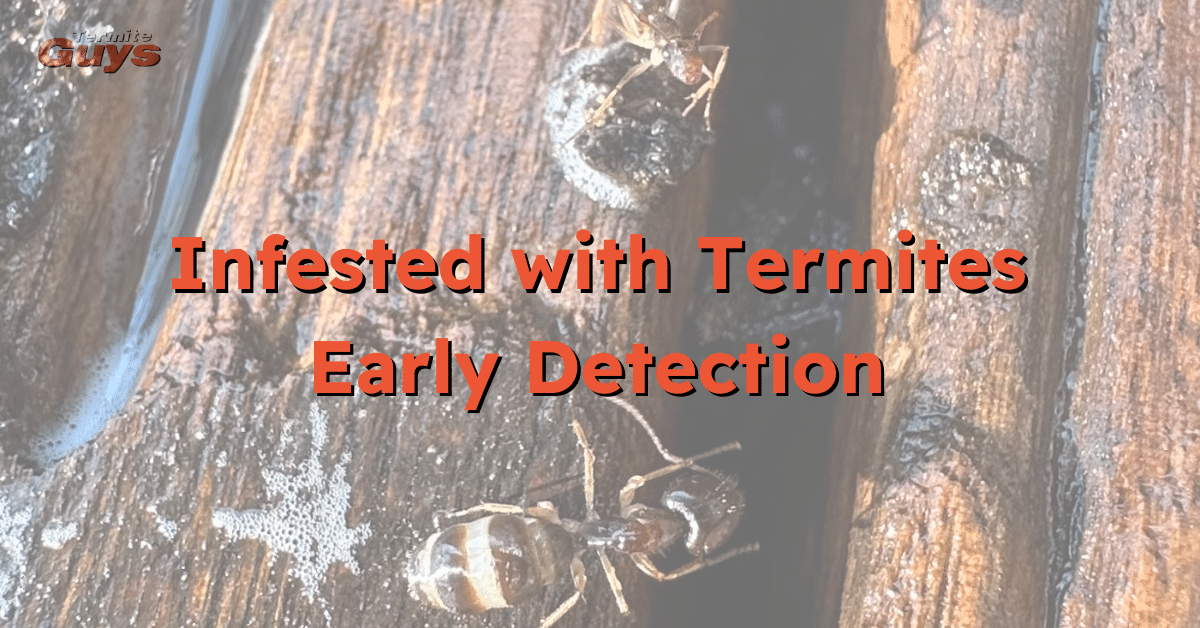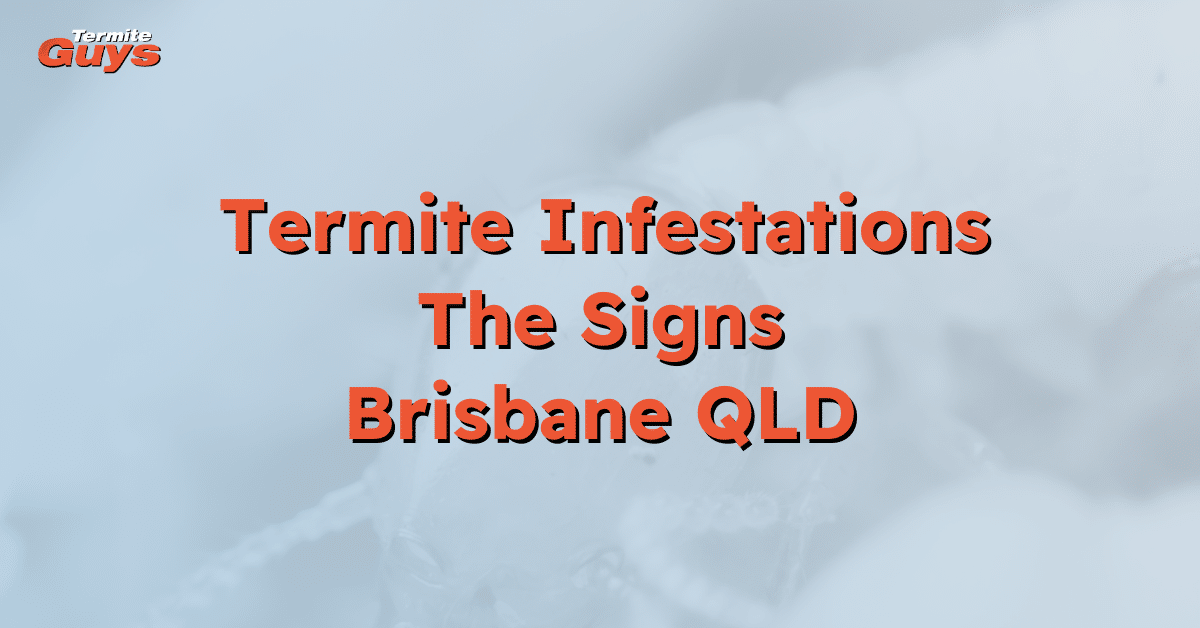Infested with Termites! Termite Awareness Brisbane includes recognizing signs of infestation and understanding the importance of regular termite inspections. Professional inspection services can identify damage early, ensuring timely termite treatment and effective residential or commercial termite control.
Infected With Termites? Termite Guys Brisbane Shares Signs, Solutions, and Prevention Tips!
Importance of Early Detection
Termite awareness is super important for people living in Brisbane. The warm weather makes it easy for termites to thrive. If you catch them early, you can avoid big damage and high repair costs. Termites are often called “silent destroyers.” They can invade your home without you knowing until it’s too late. This is why regular termite inspections are key to spotting potential risks before they become serious when you suspect you are infected with termites.
A termite infestation can often go unnoticed until significant damage has already occurred. Key warning signs include the sudden appearance of flying termites—called swarmers—usually spotted near windows, lights, or doors, particularly after rain. These indicate an active colony nearby. Mud tubes along foundations or walls are another red flag, used by subterranean termites to stay moist while traveling between their nest and food sources. Tapping on timber that sounds hollow may reveal internal feeding, as termites often eat wood from the inside out. Drywood termites leave behind tiny, sawdust-like droppings known as frass, typically found near baseboards or window frames. Other indicators include tight-fitting windows or doors due to warped wood, bubbling or peeling paint caused by moisture introduced during tunneling, and faint clicking or rustling noises from within walls. If any of these signs appear, it’s essential to contact a licensed pest control professional immediately for inspection, proper identification, and effective treatment.
Here are some signs of termite infestation to watch for:
Mud Tubes Along Walls (Shelter Tubes):
These small, earth-colored tunnels are built by subterranean termites to connect their underground nests to wood sources above ground. They act like protected highways, shielding termites from light, predators, and dehydration. You’ll typically find them on concrete slabs, brickwork, or timber posts. Breaking one may reveal live termites—but it’s best left to professionals.Hollow-Sounding Wood:
Termites consume wood from the inside out, leaving only a thin surface shell. When tapped, affected wood often sounds papery or hollow. This damage commonly affects door frames, baseboards, floors, or support beams, and is often more widespread than it initially appears.Discarded Wings Near Doors or Windows:
Reproductive termites (swarmers) shed their wings after mating. These wings often collect in piles around window sills, doorways, or light fixtures. Their presence indicates a colony may be nearby—or already active inside your home—and warrants immediate inspection.Small Holes in Wood Structures:
Drywood termites create small exit holes to push out frass. These holes are often accompanied by tiny piles of sawdust-like material below. Though they may look minor, they can signal significant hidden damage and should prompt a professional assessment.Termite Droppings (Frass):
Appearing as fine, wood-colored pellets, frass is often found near baseboards, windowsills, or furniture. It’s a clear sign of drywood termite activity within the structure and should never be ignored.Stuck Windows and Doors:
As termites tunnel and introduce moisture into timber, frames may warp. This can make windows and doors difficult to open or close. Often mistaken for humidity issues, this could be early evidence of internal termite damage.Bubbling or Peeling Paint:
Termite moisture can cause paint on walls or wood trim to blister or peel—similar to signs of a leak. If no plumbing or water damage is found, termite activity should be considered.Unusual Noises:
In a quiet room, particularly at night, you may hear faint clicking, rustling, or tapping from within the walls. These sounds are termites feeding or communicating, and suggest active infestation inside wooden structures.
Spotting these signs early helps homeowners take action with proactive pest management. In Brisbane, termite risks are significant due to many species living in the area. Subterranean termites are especially dangerous because they live underground and can cause major structural damage if they’re not found quickly. By focusing on regular inspections and knowing the signs of an infestation, residents can protect their homes from serious harm.

Suspecting You Are Infested With Termites?
What to Do if You Suspect Termites Infestation!
1. Contact a Pest Control Professional Immediately
If you notice signs such as mud tubes, discarded wings, frass (termite droppings), or hollow-sounding wood, don’t delay. Termites work silently and quickly, often causing thousands of dollars in damage before they’re detected. A licensed pest control expert has the training and tools to accurately identify the species, assess the extent of the infestation, and recommend a targeted treatment plan. Choose a reputable company with termite-specific experience and local knowledge, especially in high-risk areas like Brisbane.2. Do Not Disturb Termite Activity
It may be tempting to break open a mud tube or poke at damaged wood, but this can make the problem worse. Disturbing termites may cause them to retreat deeper into hidden areas, scatter into new sections of your home, or go dormant temporarily—making them harder to locate and treat effectively. The best action is no action until a professional arrives.3. Seek Expert Guidance on Treatment Options
Every infestation is different. A trusted pest control provider will assess your home’s layout, termite species, and damage level before offering a solution. Treatment may include:Termite Baits: Slow-acting toxins that termites carry back to the colony.
Chemical Barriers: Liquid treatments injected into soil to block and kill invading termites.
Direct Wood Treatments: Injected or sprayed solutions targeting active termite zones.
Fumigation: A whole-structure gas treatment for widespread or hard-to-reach infestations.
Each method has different strengths, costs, and timelines. Ask questions and understand your options before proceeding.
4. Take Preventive Measures (Tips) to Stop Future Infestations
Even after successful treatment, prevention is critical. Termites will return if conditions stay favorable. Be proactive by:Fixing plumbing leaks and improving drainage to reduce moisture around your home.
Keeping crawl spaces and underfloor areas well-ventilated.
Sealing all cracks or gaps around foundations, pipes, and vents.
Storing firewood, mulch, and timber off the ground and well away from exterior walls.
Scheduling annual termite inspections to catch new activity early.
By acting swiftly, following professional advice, and maintaining termite-resistant conditions, you can protect your home and avoid expensive structural damage.
Types of Termites in Brisbane
Brisbane has several types of termites that can affect homes and buildings differently. Knowing about these species helps you understand their behaviors and where they might live.
Subterranean Termites
Subterranean termites are among the most harmful pests found in Brisbane. They create complex tunnels underground and need moisture from soil or wood to survive. These termites can enter homes through foundations or mud tubes leading up into wooden areas like beams or floors.
The lifecycle of subterranean termites includes:
- Eggs
- Nymphs
- Workers
- Soldiers
- Reproductive adults
Each stage has a specific role in their colony. They eat cellulose material, so if untreated wood goes unnoticed, it may suffer severe damage over time.
Drywood Termites
Drywood termites are different because they do not need soil contact; instead, they infest dry wood right inside homes. These wood-destroying insects create colonies in furniture or construction materials above ground.
To spot drywood termite activity, look for frass (which looks like sawdust) around infested areas. This sign shows that they are present without needing to check underneath floors or walls as other types might require more thorough inspection.
Inspection Services
Comprehensive Inspections
In Brisbane, a thorough termite inspection is important for both homes and businesses. It checks inside and outside a property to spot any signs of termites or potential issues. Inspectors look at wooden structures, foundations, and landscaping where termites might hide.
The termite risk assessment is a big part of this. Experts check moisture levels and wood conditions that attract pests. Pest inspection services can also set up ongoing termite management plans. These plans help keep properties safe over time. Regular inspections catch infestations early, which stops major damage.
Pre-Purchase Inspections
If you’re thinking about buying a home or business in Brisbane, you need a pre-purchase termite inspection. This helps you find out if there are any termite issues that could hurt your investment. By spotting structural damage from termites early, buyers can negotiate repairs or even rethink the purchase.
Residential and commercial termite control options differ based on the property type and needs. A pre-purchase inspection protects property value and gives future owners peace of mind about pest issues.
Residential and Commercial Inspections
Both residential and commercial inspections are key to keeping spaces safe in Brisbane suburbs like Tingalpa, Morningside, Belmont, Manly West, Wynnum West, Capalaba, Riverhills, Bellbowrie, Pullenvale, Kenmore Hills, Forest Lake, and Gumdale. These inspections identify areas at risk for infestations and check how past treatments worked.
It’s vital to understand structural damage from termites during these checks. Inspectors look for hollowed-out wood or mud tubes that show active colonies nearby. After the inspection, solutions are suggested based on whether the property is residential or commercial. This helps make sure the right treatment strategies are used to keep future invasions away effectively.
Treatment Solutions Options for Infestations
Chemical Treatments
Chemical treatments are a popular way to tackle termite infestations in Brisbane. These methods use specific pesticides that can kill termites effectively. The main goal of chemical termite treatment is to get rid of the existing colony and prevent future infestations.
In homes, many people hire professionals for chemical applications. This is because it can be tricky to find hidden colonies in walls and floors. Commercial spaces also need these treatments to protect important assets and keep the place safe.
Brisbane has a climate that makes termite risks higher, so regular inspections are important along with chemical treatments. Some common types of chemicals include liquid termiticides, which create barriers around buildings, and baiting systems, which help with ongoing control.
Non-Chemical Solutions
If you prefer alternatives, non-chemical solutions offer eco-friendly ways to manage termites without harsh chemicals. Natural termite control focuses on prevention and long-term management instead of just getting rid of visible pests.
Here are some effective non-chemical methods:
- Physical barriers: Installing barriers during building or renovation can stop termites from getting in.
- Moisture control: Keeping your property dry is crucial since termites like damp areas. Fixing drainage issues can help.
Baiting Systems
Baiting systems are smart strategies for managing pest populations over time. These systems have stations with attractants that lure termites away from structures while delivering slow-acting insecticides when they eat them.
This method not only targets active colonies but also helps keep track of activity levels around your property. Homeowners and businesses stay informed about their risk status.
Barriers
Using physical barriers is another key part of non-chemical solutions against termites. Termite barriers can be made from steel mesh or treated wood. They go under foundations or along walls where termites could cause damage.
These barriers block subterranean termites from entering buildings. They also help with moisture control through proper ventilation in crawl spaces. This keeps conditions less inviting for pests overall.
Effective Prevention Tips
Termites can be a big problem for homeowners. Protecting your property from these pests is really important. Here are some simple tips for termite prevention.
Moisture Control Strategies
Moisture attracts termites, so controlling it is key. Here are some easy steps to manage moisture:
- Install Good Drainage: Make sure rainwater flows away from your home. This stops water from pooling around the foundation.
- Check Damp Areas: Look at places like basements and crawl spaces often. Check for leaks or wet spots that might invite termites.
- Use Dehumidifiers: In humid areas, using dehumidifiers helps keep moisture low inside your house. This makes it less appealing to termites.
Landscaping Considerations
Your yard can affect termite activity near your home. By making smart choices, you can reduce the risk:
- Keep Soil Away from Wood: Use non-organic mulch instead of wood chips near wooden parts of your home like decks and fences.
- Trim Plants: Keep branches and shrubs away from your roofline. This helps stop termites from getting in.
- Choose Termite-resistant Plants: When planting, select plants that are not appealing to termites.
Signs of Infestation to Watch For
Noticing termite problems early is very important. Keep an eye out for these signs:
- Look for mud tubes along walls. These are like highways for termites moving between their colony and food.
- Check for visible wood damage that may mean they are feeding on it.
- Swarming during springtime can show nearby colonies getting ready to start new nests.
Damage Repair Process
If you find damage caused by termites, act quickly:
- Evaluate Damage: Get a professional to help check how bad the damage is.
- Plan Repairs: Figure out if you need minor repairs or major reconstruction based on what you find.
- Use Treated Wood or Strong Materials: When fixing damages, choose treated wood or materials that resist future infestations.
By following these tips and knowing what to watch for, homeowners can protect their properties from termites effectively while maintaining peace of mind through proactive pest management practices.
Why You Can Trust Termite Guys Brisbane!
Termite Guys Brisbane has earned its reputation as one of the most sought-after termite inspection and treatment providers in the region by combining expert knowledge with a customer-first approach. Homeowners across Brisbane trust their team for one simple reason: results. Their licensed technicians bring years of field experience, advanced detection tools, and a deep understanding of local termite species and behaviors. From high-risk suburbs to new developments, Termite Guys Brisbane tailors each inspection and treatment plan to the property—ensuring no shortcuts, no surprises, and no missed colonies. Whether it’s pre-construction barriers or urgent infestation treatments, they deliver precision and professionalism every time.
What truly sets Termite Guys Brisbane apart is their commitment to education, prevention, and long-term protection. They don’t just treat the problem—they help you understand it. Clear reporting, honest advice, and real-world prevention tips mean customers aren’t left in the dark. Their follow-up care and inspection reminders show they’re in it for the long haul, not just a one-time job. With a proven track record, transparent pricing, and fast response times, it’s no surprise Termite Guys Brisbane continues to be the go-to choice for homeowners who want peace of mind and proven termite protection that lasts.
Testimonial!
I have been doing business with Cameron for many years and value him as a friend. He is extremely professional, reliable, polite and does an outstanding job. Michelle is also brilliant. Again very professional, helpful and friendly. Your company is an absolute pleasure to work with. In my opinion a fantastic team. My appreciation and thanks to all. Betty-Ann Bellette !
Real-Life Examples from Brisbane Suburbs
Termites can be a big problem for homeowners in Brisbane. It’s really important to know how to spot them early and have a plan for controlling them. Here are some real-life stories from different suburbs that show why termite awareness and action are so crucial.
Tingalpa, Morningside, Belmont
In Tingalpa, Morningside, and Belmont, people often see signs of termite infestation. Common signs include mud tubes on walls and wood that sounds hollow when you tap it. Catching termites early can help save a lot of money by stopping structural damage from termites.
For example, there was a case in Morningside where homeowners found small piles of sawdust near their wooden beams. A full pest inspection uncovered an active colony inside their home. Thanks to fast action with residential termite control methods, they not only got rid of the pests but also fixed the damaged areas to stop future infestations.
Regular pest inspections are super important in these suburbs. They help homeowners find potential risks around their homes before they turn into big problems or costly repairs.
Manly, Wynnum West, Capalaba
In Manly, Wynnum West, and Capalaba, the warm weather makes seasonal termite activity common. Flying termites come out more during the warmer months, so it’s key for residents to check their properties regularly.
One story involves a homeowner in Wynnum West who had flying termites invade her deck during peak season. She used ongoing termite management methods along with professional treatments like baiting systems and chemical barriers. This smart approach helped her keep her property’s value intact while protecting against further invasions.
Protecting property value is super important! Local businesses often invest in commercial termite control services to make sure their buildings stay safe from hidden infestations.
Each suburb has its own challenges with termites in Brisbane. But by taking proactive steps like regular inspections and quick action, residents can keep their homes safe from these destructive pests.
Regular Blog Updates on Education
Understanding Behavior
Understanding termite behavior helps in pest management. Termites are social insects. They live in colonies, and their habits can be different based on their species. Common types found in Brisbane include Subterranean, Drywood, and Formosan termites. Each type behaves uniquely. For example, Subterranean termites build mud tubes to reach wood and keep moist. On the other hand, Drywood termites create tunnels inside the wood they eat.
The termite lifecycle has several stages: egg, nymph, worker, soldier, and reproductive adult. Seasonal activity matters too; many termites swarm in warm months when conditions are just right for new colonies. Knowing these patterns helps homeowners spot possible infestations early.
Debunking DIY Myths
There are a lot of myths about DIY termite control that can lead to bad solutions or make things worse. One myth is that natural remedies like vinegar or essential oils can get rid of all termite problems effectively. While these might scare off some pests temporarily, they don’t fix serious infestations.
Another myth is that using cheap pest solutions can work long-term without needing professional help. The truth is, figuring out what kind of infestation you have needs expert knowledge—something most homeowners don’t have without pest control training.
Importance of Ongoing Education
Ongoing education about termites is important for homeowners and professionals alike. Termite awareness programs give helpful information on how to prevent problems and the need for regular inspections through services provided by experts like those at Termite Guys Brisbane.
Proactive pest management involves spotting signs of an infestation early—like discarded wings or mud tubes—and knowing when to call a professional before damage becomes expensive due to wood-destroying insects.
Engaging with the Community
Getting the community involved helps raise awareness about termite risks across Brisbane suburbs like Tingalpa, Morningside, Belmont, Manly West, Wynnum West, Capalaba, and others. Local initiatives focused on teaching residents preventive measures help build caution against potential infestations in neighborhoods.
Workshops run by local councils or community groups offer insights into spotting trouble early while encouraging neighbors to work together on inspection schedules or sharing resources about pest control methods suited for their area’s needs.
Resources and Tools for Homeowners
Homeowners can use various tools made for detecting termites before they cause major damage. Moisture meters are practical tools used with visual checks; high moisture levels often mean hidden nests are close because termites love humid areas near wood structures.
Thermal imaging technology gives another smart option—it lets inspectors see temperature changes from active colonies behind walls without tearing things up! Using these advanced detection methods gives property owners the knowledge needed to keep living spaces safe from destructive pests over time.
FAQs About Termite Awareness in Brisbane
What are the signs of termite infestation?
Common signs include mud tubes, hollow-sounding wood, discarded wings, and small holes in wooden structures.
Why are regular inspections important?
Regular inspections help detect termite damage early. Early detection minimizes repair costs and protects your property.
What types of termites are found in Brisbane?
Brisbane has various termites, including subterranean and drywood termites. Each type poses unique risks to homes.
How can I prevent termite infestations?
You can prevent infestations by controlling moisture, using physical barriers, and maintaining your landscaping effectively.
What is termite baiting?
Termite baiting involves using stations that attract termites. These stations deliver slow-acting insecticides to eliminate colonies.
What should I do if I find termite damage?
Get a professional evaluation. They will assess the damage and recommend the necessary repairs.
Key related points:
- Termite Treatment Options: Explore chemical treatments and non-chemical solutions for effective management.
- Early Detection Methods: Use moisture meters and thermal imaging to spot hidden termite activity.
- Natural Termite Control Solutions: Implement eco-friendly methods for prevention and ongoing management.
- Understanding Termite Behavior: Study the habits of different species for better control strategies.
- Seasonal Termite Activity Awareness: Be vigilant during warmer months when swarming occurs.
- Budget-Friendly Pest Solutions: Look for cost-effective strategies to protect your property from termites.
- Termite Activity Monitoring Tools: Invest in tools to track and assess potential infestations regularly.
- Termite Protection Systems: Utilize barriers and resistant materials to enhance property safety.
Do You Suspect Home Is Infested With Termites
If you notice hollow-sounding wood, mud tubes on walls, or discarded termite wings, your home may be infested. These are signs termites are active. Don’t wait—early detection prevents costly damage. Call Termite Guys Brisbane for a professional termite inspection and protect your home today.
Our Service Areas Near Brisbane Include:
- Brisbane City
- Hemmant
- Murarrie
- Tingalpa
- Burbank
- Mackenzie
- Norman Park
- Belmont
- Manly
- Manly West
- Wynnum & Wynnum West
- Gumdale
- Capalaba
- Birkdale
- Ransome
- Other surrounding Brisbane suburbs
If you discover a termite infestation in your home, act quickly. Avoid disturbing the affected area and contact a licensed professional immediately. If you're in Brisbane or nearby suburbs, our local termite specialists are ready to help with thorough inspections and effective treatments to protect your property and restore peace of mind.
Book Your Free Termite Assessment
Get a Free Assessment NowFrequently Asked Questions
Do you offer termite inspections in Brisbane?
Yes! Termite Guys Brisbane provides thorough termite inspections for homes and businesses in Brisbane and neighbouring Bayside suburbs. We use advanced tools (thermal imaging cameras to detect hidden termite activity early.
How much does a termite inspection cost in Brisbane?
We offer free termite assessment for Brisbane residents. Final costs depend on your property’s size and treatment needs. Contact us for a personalised, no-obligation estimate.
Are you licensed to perform termite treatments in my suburb?
Absolutely. Our technicians are fully licensed and insured to carry out termite inspections and treatments in all Brisbane suburbs we service, including Manly, Wynnum West, Tingalpa, Cleveland, Runcorn, Bulimba, Hawthorne, Carina, Camp Hill and more.
How often should I get my house checked for termites?
We recommend annual termite inspections, especially for older timber homes in Brisbane’s humid climate. Regular checks help you avoid expensive structural damage.
What should I do if I find termites?
Don’t disturb them — this can cause them to spread deeper into your home. Call Termite Guys Brisbane immediately for a professional inspection and safe treatment plan.
Your home is your biggest investment — let us help you keep it termite-free. Contact our friendly local team today!


